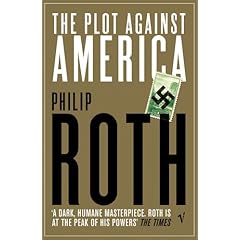 This review has been outstanding for about a month and a half, and for that I apologize. I read it back when I was working towards a big deadline, and I just didn't find time to review it back then. But here it is, now...
This review has been outstanding for about a month and a half, and for that I apologize. I read it back when I was working towards a big deadline, and I just didn't find time to review it back then. But here it is, now...
I stumbled on to this book by chance. One of my colleagues recommended The Man In The High Castle to me, fleetingly, and it sounded quite interesting. However, by the time the day had come to a close, and I got home, I just couldn't remember the name of the book. So, I googled something like 'World War II alternate reality", and guess what I found: Philip Roth's The Plot Against America. I still haven't read The Man In The High Castle, but this, this was fantastic! Is this what they call 'serendipity'? A fortunate mistake? Because, it sure was. Barring the classics that are Gatsby and A Clockwork Orange, this has been my favorite book in 2009.
The premise of the book is both, credible and simple: what if Lindbergh had won the 1940 Presidential election, instead of Franklin D. Roosevelt? In an interview, Roth says he stumbled upon a sentence in Schlesinger's notes, which stated something along the lines of: Some Republican isolationalists wanted Lindbergh to run for President in 1940. And so, the book was born.
Roth has gone to great lengths to keep all the other events as historically accurate as possible, so much so that the book actually seems like real history. The political characters, the speeches, historical events - they all seem to add up. He even chose Winchell to lead the opposition against Lindbergh, as he hated the latter; calling him pro-Nazi from the moment Lindbergh propagated the cause of America not intervening in events geographically far away from them. I concede that the thought of Winchell ever running a political opposition against the President of the United States is scary, but, then again, you can say the same about Lindbergh becoming President. Nonetheless, one can also see why Lindbergh becoming President was not as incredible as it sounds: an aviation hero (making the first transatlantic flight in the late 1920s), he gained public sympathy when his child was kidnapped and murdered. He said 'Hitler was a great man,' but simultaneously voiced what must have been a very popular opinion: No American should die on foreign soil! So, yes, what if Lindbergh occupied the White House in 1940...
While some of the historical accuracies makes the book 'real', what makes it magnificent is that Roth chooses to write it in first person, in a direct way, where the narrator is Roth's younger self - all of seven when the book starts. Living with his parents, his older brother and his cousin, Roth's narration is a mixture of childhood pains and adult intelligence.
The book opens with:
Fear presides over these memories, a perpetual fear. Of course no childhood is without its terrors, yet I wonder if I would have been a less frightened boy if Lindbergh hadn't been President, or if I hadn't been the offspring of Jews.
One of the so-called pains is when one of the neighboring kids tries to befriend him, but Roth only has disdain for him, even after Seldon saves his life. In fact, the greatest tragedy of the book is orchestrated by Roth, inadvertently, and one ends up feeling the greatest sympathy for Seldon's loss.
While Roth is fighting these childish personal battles, he is also aware of the political environment, that seems to be pulling his family apart, as all its members are dealing with Lindbergh as President in their own world. His cousin runs away from home, to fight the War, and comes home with a prosthetic leg and anger - anger at how things turn out. His brother idolizes Lindbergh, and uses his artistic talents to create amazing portraits of him, which he keeps hidden under his bed. His father is furious with the turn of events - specially, when he takes his family on a holiday to Washington, and their hotel room is rendered unavailable. Bess (his wife) is embarrassed, as he reminds the people around him of the Gettysburg principle : All men are created equal. It's no avail, and they are forced to find another hotel room. They live the dream, Philip's father says, and we live in a nightmare.
As the book progresses, and more anti-Semitism is introduced through programs like 'Just Folks', which encourages Jewish city boys to go and work on a farm for a summer. Philip's older brother, Sandy, is one such member, and he is later requested to encourage other Jewish boys to do the same. Bess' sister, Evelyn, has a boyfriend who is a Rabbi, a Rabbi who propagates Lindbergh's cause, insisting what's happening in Germany is completely different to what's happening in America; i.e. the Jews should enter into a country life, and disappear into it. This adds more friction to the family relationships.
Can you imagine this? A fascist America? The President of the Free World being anti-Semites? America siding with Germany during the War, and signing non-aggression treaties? I can't, not for the life of me. But Roth, he's managed to a spectacular job of bringing something we can't imagine to life, and making us grateful that for once, the 'what if' didn't quite pan out.
Overall, a 9 on 10.